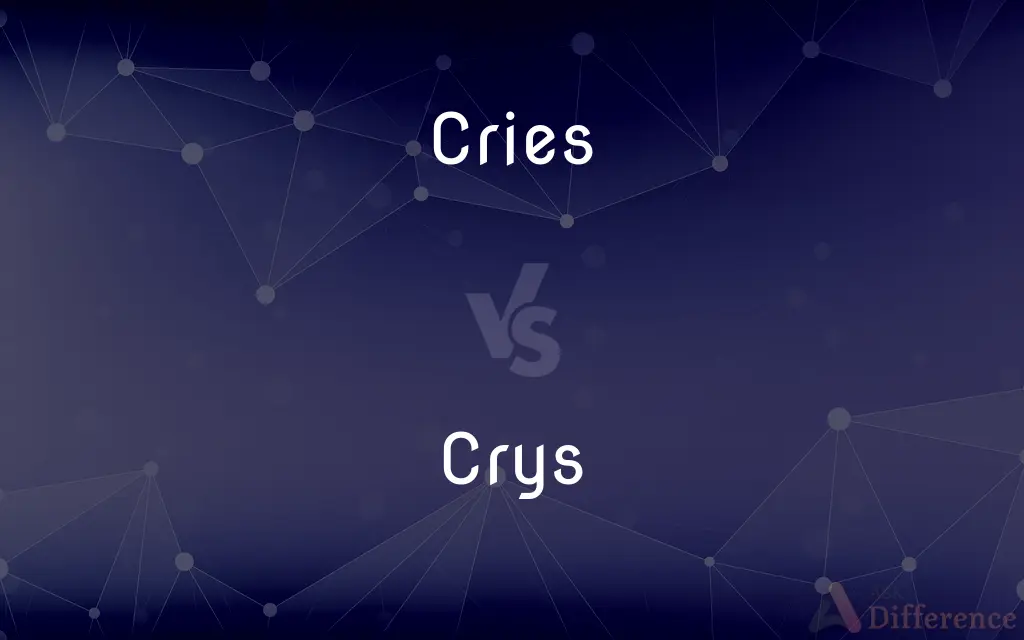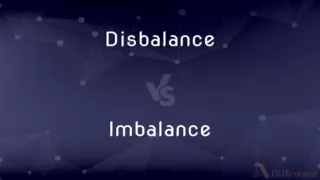Cries vs. Crys — Which is Correct Spelling?
By Tayyaba Rehman & Fiza Rafique — Updated on March 19, 2024
The correct spelling is "Cries," which refers to vocal expressions of distress, sorrow, or joy. "Crys" is an incorrect spelling of the word.

Table of Contents
Which is correct: Cries or Crys
How to spell Cries?

Cries
Correct Spelling

Crys
Incorrect Spelling
ADVERTISEMENT
Key Differences
Recall that "cry" changes to "cries" because "y" becomes "ies" in the plural.
Consider the pattern; 'fly' turns to 'flies,' and 'cry' turns to 'cries.'
Associate 'cries' with 'sighs,' both ending in 'ies.'
Think of the phrase, "When more than one baby cries, 'i' becomes 'ie.'"
Remember, "Cries has eyes," since "ie" resembles eyes and both involve emotion.
ADVERTISEMENT
How Do You Spell Crys Correctly?
Incorrect: Every time she watches a sad movie, she cries.
Correct: Every time she watches a sad movie, she cries.
Incorrect: The sound of their crys filled the room.
Correct: The sound of their cries filled the room.
Incorrect: The baby's crys can be heard across the apartment.
Correct: The baby's cries can be heard across the apartment.
Incorrect: She cries out in joy whenever she hears the good news.
Correct: She cries out in joy whenever she hears the good news.
Incorrect: He always cries at weddings.
Correct: He always cries at weddings.
Cries Definitions
Sounds signifying happiness or excitement.
Cries of joy filled the room.
A loud animal vocalization.
The cries of the wolves were haunting.
Vocalizations of distress or sorrow.
Her cries could be heard down the hallway.
A rallying call or chant.
The crowd's cries were deafening.
A formal complaint or accusation.
There were cries for justice after the incident.
Third person singular present tense of cry.
Plural of cry
The crowd paid no attention to her cries for help.
Cries Meaning in a Sentence
The kitten cries whenever it's left alone.
She cries tears of happiness at the reunion.
He cries in frustration when he can't solve the problem.
Listening to the cries of wild animals at night is eerie.
The baby cries for food and attention.
She often cries at the beauty of sunsets.
The child cries from the pain of a scraped knee.
Her voice cries out in the wilderness, calling for change.
Their cries for help were finally heard.
The audience cries and applauds at the end of the performance.
The soldier cries in relief after the rescue.
The crowd cries out in surprise during the show.
They hear the cries of joy from the winning team.
Cries Idioms & Phrases
Cries of joy
Expressions of extreme happiness or relief.
When they announced her name as the winner, her cries of joy filled the room.
Cries over spilled milk
To be upset about things that have already happened and cannot be changed.
She never cries over spilled milk, choosing instead to move forward.
Cries wolf
To give a false alarm; to warn of a danger that is not there.
He's known to cry wolf, so it's hard to take his warnings seriously.
Cries for the moon
To yearn for the impossible or unattainable.
Dreaming big is one thing, but don't cry for the moon; be realistic about your goals.
Cries foul
To complain about a perceived wrongdoing or unfair treatment.
The losing team cried foul over the referee's decision.
Cries the blues
To express one's deep troubles or sorrows, especially in music.
The singer cried the blues, telling stories of heartache and loss.
Cries in the wilderness
Speaking out about an issue but not being heard or heeded by others.
His warnings about the environmental crisis were like cries in the wilderness.
Cries on someone's shoulder
To go to someone for comfort or sympathy.
Whenever I'm upset, I know I can always cry on my best friend's shoulder.
Cries oneself to sleep
To weep until falling asleep, usually from sadness.
After the breakup, she cried herself to sleep for many nights.
Cries it out
To allow an emotional release through crying.
Sometimes, you just need to cry it out and let go of all that pent-up emotion.
Common Curiosities
What is the pronunciation of Cries?
/kraɪz/
What is the plural form of Cries?
"Cries."
Why is it called Cries?
From the verb "cry," meaning to shed tears or vocalize emotion.
What is the root word of Cries?
"Cry."
Is Cries a negative or positive word?
Neutral, depends on context.
What is the verb form of Cries?
"Cry" or "crying."
Which vowel is used before Cries?
Depends on the preceding word.
Which conjunction is used with Cries?
"And" or "or."
Is Cries a vowel or consonant?
It's a word containing both.
Is Cries a countable noun?
Yes.
Is Cries a collective noun?
No.
Is the Cries term a metaphor?
It can be used metaphorically.
What is the singular form of Cries?
"Cry."
Which preposition is used with Cries?
"Of" or "for" are common.
Is Cries a noun or adjective?
Noun.
Is Cries an abstract noun?
Yes.
How do we divide Cries into syllables?
Cries.
What is another term for Cries?
Wails, shouts, or sobs.
What is the opposite of Cries?
Laughter or silence.
Is the word Cries imperative?
No.
Is the word “Cries” a Direct object or an Indirect object?
Can serve as either.
What is a stressed syllable in Cries?
The entire word is stressed.
Which determiner is used with Cries?
"The" or "a" can be used.
What is the first form of Cries?
Cry.
Which article is used with Cries?
"The" or "a."
Is Cries an adverb?
No.
Is the word Cries a gerund?
No.
What part of speech is Cries?
Noun or verb.
What is the third form of Cries?
Cried.
How is Cries used in a sentence?
"The baby cries when he is hungry."
How many syllables are in Cries?
One syllable.
What is the second form of Cries?
Cried.
Share Your Discovery

Previous Comparison
Cheesey vs. Cheesy
Next Comparison
Disbalance vs. ImbalanceAuthor Spotlight
Written by
Tayyaba RehmanTayyaba Rehman is a distinguished writer, currently serving as a primary contributor to askdifference.com. As a researcher in semantics and etymology, Tayyaba's passion for the complexity of languages and their distinctions has found a perfect home on the platform. Tayyaba delves into the intricacies of language, distinguishing between commonly confused words and phrases, thereby providing clarity for readers worldwide.
Co-written by
Fiza RafiqueFiza Rafique is a skilled content writer at AskDifference.com, where she meticulously refines and enhances written pieces. Drawing from her vast editorial expertise, Fiza ensures clarity, accuracy, and precision in every article. Passionate about language, she continually seeks to elevate the quality of content for readers worldwide.












































